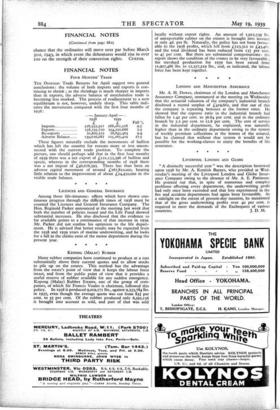KEPONG (MALAY) RUBBER
Many rubber companies have continued to produce at a rate substantially above their current quotas and to allow stocks to pile up on the estates. This method has the advantage from the estate's point of view that it keeps the labour force intact, and from the public point of view that it provides a useful reserve of rubber available for any sudden emergency. Kepong (Malay) Rubber Estates, one of the group of com- panies, of which Sir Francis Voules is chairman, followed this policy. In 1938 it produced 9,019,171 lbs., against 9,333,784 lbs. in 1937, even though the average quota was cut from 83f per cent. to 55 per cent. Of the rubber produced only 6,592,156 is brought into account as sold, and part of that was sold locally without export rights. An amount of 1,912,539 lbs. of unexportable rubber on the estates is brought into account at only 4d. per lb. Naturally, the policy has not been favour- able to the 1938 profits, which fell from £123,312 to £43,467, and the total dividend has been reduced from 131 per cent. to 41- per cent. But there are substantial compensations: the report shows the condition of the estates to be very favourable ; the standard production for 1939 has been raised from 11,907,486 lbs. to 12,357,219 lbs., and, as indicated, the labour force has been kept together.


















































 Previous page
Previous page